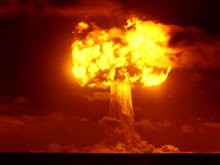Monday, May 25, 2009
La Planeta De Los Apes
Tuesday, May 12, 2009
Stranger Then Fiction
Tuesday, February 10, 2009
R&G Are Finally Dead
Rosencrantz and Guildenstern have finally been sent to their deaths. As the play closed I found myself occupied by one question, is this it? I found the ending of the play to be rather anti-climatic and not at all what I had expected. I had thouight that Rosencrantz and Guildenstern would be hung, especiall after the player’s lamentations over his last botched execution. Instead the two merely disappear, and it is later discovered that they are dead. Throught the play, the only thing that they really knew was that they would eventually die.
Monday, February 9, 2009
Who Won?
My own personal belief outside of the assignment is that the Tails team won because we had more points.
Wednesday, February 4, 2009
R & G Are Living...for the moment
Thursday, January 29, 2009
Rhetoric
Sources:
http://www.bartleby.com/124/pres56.html
http://www.google.com/hostednews/ap/article/ALeqM5h4SrWpZNd-yocKSO7_9FO51iLJowD95R4RTG0
Wednesday, January 28, 2009
R & G Are Still Dead
To Be Revised
Tuesday, January 13, 2009
Rosencrantz and Guildenstern are Dead
My initial thoughts on Rosencrantz and Guildenstern Are Dead is that it is interesting. Out of the two main charecters my favorite so far is Ros. He's defintly starting out as the funnier of the two and the one more inclined to accept reality. As for what we discussed in class I agree that Guildenstern is definatly trying to come to terms with reality. My favorite piece of banter between the two would be about fingernails and beards.
Sunday, January 4, 2009
Hamlet’s spiritual and philosophical changes
Hamlet undergoes a major shift spiritually as well as philosophically throughout the play. During Act I, Hamlet is approached by the Ghost of his father, King Hamlet. This ghost informs Hamlet that he was murdered by King Claudius, and that his murder must be avenged. Hamlet is shocked by this and, although he believes the ghost, he initially thinks not of killing Claudius but of what he has done. Later, in Act II while Hamlet is watching the players, he sets a trap for Claudius. Hamlet is still bound to be completely sure that it is Claudius that killed his father, despite being told so by the ghost he cannot kill without reason. “I’ll have grounds more relative then this. The play’s the thing wherin I’ll catch the conscience of the king.” (II 532-533). Hamlet still maintains his beliefs that killing should not be done without a just cause. However in Act III he begins to change. During Act III the ghost is proven correct as Claudius flees the play, and Hamlet gains new vigor in his quest. He spies Claudius praying, draws his sword and stops, “’Am I then revenged to take him in the purging of his soul, when he is fit and seasoned for his passage? No! Up, sword, and know thou a more horrid hent’” (III 84-89). Hamlet won’t kill the king now because that would mean he would go to heaven, instead it would be better that he be sent to hell when he is not expecting it. Hamlet has come a long way from refusing to kill without good reason, to now planning the perfect moment. As Act III ends, Hamlet has now decided to kill the king, he only needs an opportunity. This is given when he hears “Claudius” eaves dropping on Hamlet and the Queen, “’How now? A rat? Dead for a ducat, dead! [thrust his rapier through the arras]” Polonius is now dead, and Hamlet stands holding the bloody sword, rather then being disgusted with himself for committing murder, hamlet does not care. He is simply disjointed that he has killed the wrong man. It is this act that marks Hamlet’s final plunge away from his previous morals, ethics, and respect for life. Shortly following this Hamlet has Rosencrantz and Guildenstern killed by the King of England for helping his uncle/father. (V 47-60). Not only does Hamlet murder his two childhood friends, but he also had to “lie” by using the King’s signet ring.
